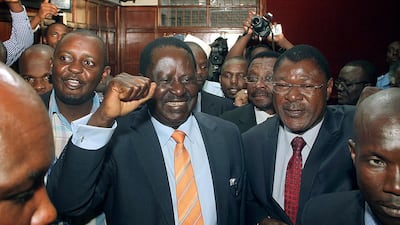NAIROBI // Kenya’s high court on Friday suspended key parts of a controversial new national security law that the opposition had warned risked turning the country into a dictatorship.
High court judge George Odunga announced that eight sections of the new anti-terrorism law would be suspended because of human rights concerns and asked the chief justice, the head of the judiciary, to set up a constitutional court to scrutinise the new law.
The move follows a legal challenge by Kenya’s opposition, with its leader Raila Odinga saying the ruling “marks a great day for Kenya”.
“Everybody feared that we were going back to those dark days of torture and dictatorship,” Mr Odinga said.
The security bill was passed by parliament last month after a debate marked by brawls between governing coalition and opposition MPs, and was signed into law by President Uhuru Kenyatta.
It hands authorities sweeping powers, including the right to hold terror suspects for nearly a year without charge.
The eight clauses suspended by the court include the threat to imprison journalists if they publish “insulting, threatening, or inciting material or images of dead or injured persons which are likely to cause fear and alarm to the general public”, or “any information which undermines investigations or security operations.”
Also suspended is the right for the prosecution to withhold certain evidence and a 150,000 ceiling on the number of refugees allowed into Kenya – which would have led to the expulsion of hundreds of thousands of refugees from Somalia, South Sudan, Sudan and other conflict-hit countries in the region.
New definitions on what constitutes inciting and aiding terrorism, as well as police surveillance powers, have also been shelved.
The government argues the measures are necessary to confront a wave of attacks by Al Qaeda-affiliated Al Shabab insurgents from neighbouring Somalia, who killed 67 people in September 2013 in an attack on a Nairobi shopping mall.
Kenya’s interior minister and police chief were sacked last month after the militants carried out two massacres in the north-east of the country.
Al Shabab says the attacks are retaliation for Kenya’s decision to send troops into Somalia in 2011. Kenyan troops are part of an African Union force battling the militants and supporting the war-torn country’s internationally-backed government.
* Agence France-Presse and Reuters

